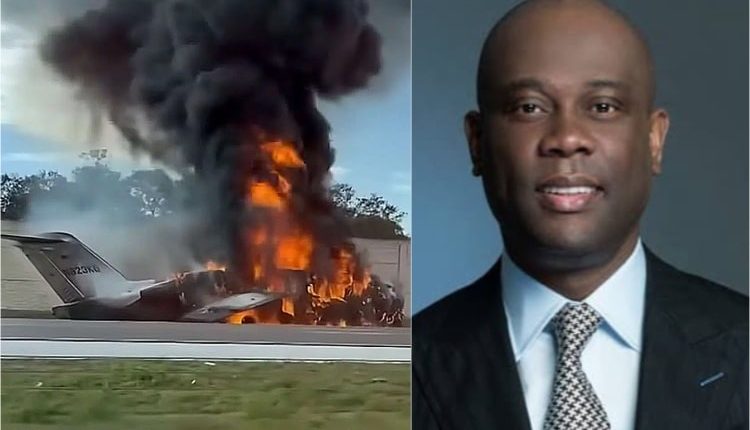BREAKING: NSIB Links Wigwe’s Helicopter Crash To Operator’s Flawed Safety Culture

The Nigeria Safety and Investigation Bureau (NSIB) has traced the tragic helicopter crash that claimed the lives of former Access Holdings CEO, Herbert Wigwe; his wife, Doreen; their son, Chizi; and former NGX Group Chairman, Abimbola Ogunbanjo, to significant lapses in the operating company’s approach to safety.
Director General of NSIB, Captain Alex Badeh Jr., revealed during an appearance on Arise TV’s Newsnight that findings from the United States’ National Transportation Safety Board (NTSB) point to entrenched issues within the helicopter firm’s safety protocols—indicating a broader systemic problem rather than a fault solely attributable to the pilot.
Recall that the fatal crash occurred on February 9, 2024, involving an Airbus EC130B4 helicopter operated by Orbic Air, LLC. The aircraft went down near Halloran Springs, California, resulting in the loss of all onboard.
According to the NTSB’s final report, several factors contributed to the incident, including the pilot’s spatial disorientation and a failure to adhere to safety guidelines. Crucially, the decision to proceed under visual flight rules despite flying in instrument meteorological conditions was flagged as a major error linked to broader operational negligence.
“You could go deeper and wonder what happened because it is more a company culture. I would not blame the pilot, they (the report) spoke about the company’s safety management systems. It seems more like a company culture than anything,” Badeh stated.
When pressed on whether negligence played a role, the NSIB boss responded cautiously: “I would hesitate to use the word negligence. I am aware they are in court now, so I do not want my words to come back and bite me later. From the report, which says the company was indicted for safety management systems, except they should have looked deeper into this.”
He further noted that the pilot’s failure to adequately consult with the flight follower—who also happened to be the company’s president—was a critical oversight.
“The pilot should have spoken to his flight follower who happened to be the president of the company and he should have looked deeper into it and said, ‘Maybe we should delay or we should do this or that.’”
On who ultimately bears responsibility in such scenarios, Badeh explained: “It is the pilot but it is always easy to blame the pilot whereas there is a system behind that pilot. There is a whole system that should have caught this and even if he did not catch it, you do not know what sort of pressure that was on him. This was a high-profile person. They knew he was a high-profile person. They know people who go for the Super Bowl are wealthy people. Everywhere, even in the United States, there is always that pressure.”
